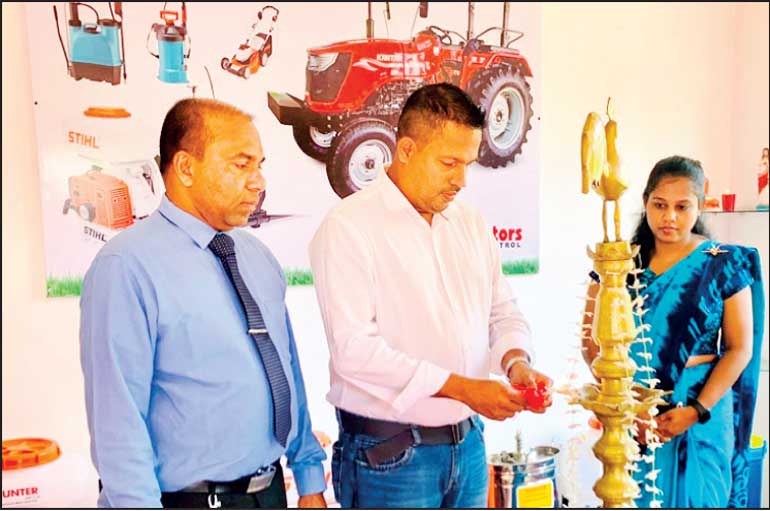Monday Feb 16, 2026
Monday Feb 16, 2026
Wednesday, 1 February 2023 00:08 - - {{hitsCtrl.values.hits}}

Enviotech Officials lighting traditional oil lamp
Exterminators PLC, Sri Lanka’s premier pest tech and environmental tech company ventured into the ‘Agricultural Sector’, setting up its first flagship ‘Agri Store’ in Dambulla, under the brand name ‘Enviotech’ to cater to the agricultural sector, plantation sector, livestock, landscape and hotel sectors by supplying novel energy saving, environmentally sustainable international brands and technologies.
Enviotech will market and distribute globally recognised brands manufactured in UK, USA, Germany, Portugal, Poland, Spain, India and China.
The company will supply a wide range of ‘Agricultural Equipment’ such as tractors, power weeders, sprayers, chainsaws, brush cutters, pruners, augers, cultivators, water pumps, trimmers, safety equipment, agricultural drones and many non-chemical crop pest management products and also a range of products and equipment for the hotel and landscape sector such as lawn movers, blowers, electric flying insect and mosquito control machines.
Exterminators Managing Director Marlon Ferreira stated: “Worldwide, it is estimated that 20% to 40% of crop yield is lost due to pests and diseases, due to new non-indigenous threats and emerging pest resistance to pesticides.
“According to research done by the Food and Agriculture Organisation (FAO), the average value of total food waste generated per day in Sri Lanka is approximately 3,963 tons which is almost 1.5 million tons per year, resulting in a significant lost.
“We anticipate that the agricultural sector will have a significant growth both nationally and internationally if its agile, digitalised, professionalised and sustainable strategies are implemented and practiced, it will immensely help in reducing food wastage”.
Exterminators believes that this is the best time to venture into the ‘Agricultural Sector’ by creating value by challenging the status quo via constant innovation to mitigate the impact on the prevailing ‘food security’ in Sri Lanka and to avoid such situations arising in the future.